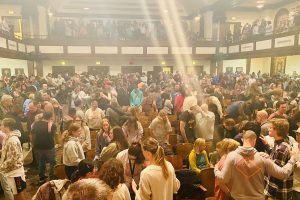Preacher, if you are at all like me, as you were preparing to write your sermon this past Sunday, your mind kept going back to the Supreme Court’s ruling on same-sex marriage. Last Sunday it was still so fresh that no one had had much time to react to it yet. This past Sunday, though, people came expecting you to at least comment on it. In my own church, while we do not yet have an official statement or position on the issue adopted, the opinions on the matter are mixed. Most are opposed to it (including me), but more than a handful are not. Perhaps your church is not so different from mine in this regard. Perhaps you didn’t yet know what to say to your congregation about the issue and so went with something else. At some point, though, you know you are going to have to address it.
When I sat down to work on the sermon this past Monday morning, I had already spent a fair bit of time over the previous weekend getting ready to write a sermon that was thematically appropriate for this morning. But as I started writing, my mind could not stop going to the previous Friday’s Supreme Court decision.
I have a friend who sends me all kinds of news items he thinks might be of interest to me and as a former editor of a Christian magazine, he’s on the list to get press releases from a number of different Christian organizations. He sent me all of them that Friday, and I read several more. The reactions were interesting. On the right, things were generally more subdued than I expected. Most groups blasted the decision as unlawful, poorly written, and poorly argued, but that was expected. Yet after only a bit of “woe is me” rhetorical hand-wringing, most groups buckled down and reminded their followers who are not supportive of the decision that our response to this needs to be one of love. Being anything other than totally loving and respectful to both heterosexual and homosexual people who are thrilled with the decision is absolutely out of place. On the left, the reaction was of course celebratory, but I haven’t seen much that smacked of the triumphalism I expected. There was no tombstone dance over the heads of their buried opponents. Instead, there was more of a calm, “Check…next”.
Still, as I have interacted with various evangelical friends in various places around the country over the past week, the general sense I’ve gotten is that they mostly feel like all the wind has been taken out of their sails. Many took this a bit like a punch to the gut and are now trying to stand back upright and figure out how to move forward again. The truth is, though, that thinking Christians who both agree with the decision and who oppose it are all trying to figure out the best way to respond to it. What do we do in light of this? In what light do we continue our mission of following Jesus and seeing His kingdom move forward in our communities? I suspect you are, or at least someone you know, are asking questions just like these. I want to try and equip you to both answer these questions and to respond to the people in your life with loving grace on whichever side of the issue they happen to fall.
How do we as conservative Christians actually respond to all of this? I think there are three basic areas in which we need to think about this. First, we need a bigger perspective on things. Genesis 1:1 declares that “in the beginning God created the heavens and the earth.” After a tumultuous tale between the two poles, John describes an incredible scene starting in Revelation 21 in which God is indisputably on His throne and all the world has been made right before Him. So in the beginning, God is in charge; at the end, God is in charge. And guess what: in the middle—where we are—God is still in charge. Nothing surprises our God. He is perfect in omniscience. He knows everything that can be known including what is going to happen in the future.
In other words, what happened on the Friday before last came as no surprised to God. Neither will it prove any kind of meaningful impediment to the advance of His kingdom. We serve the God whose plans could not be derailed by the unjust death of His Son. His church survived the Roman Empire. It survived Christendom. It survived the Enlightenment. It survived Darwinism. It survived Stalin. It survived Mao. The church is surviving ISIS and Boko Haram and Al Shabaab and Al Qaeda. Christians holding to the historically orthodox position on sex and marriage should in no way think that the legalization of same-sex marriage in this country on the basis of the opinion of five people will pose any kind of an existential threat to the church. Even if the law were to continue following the culture and criminalize holding to the historically orthodox position on marriage, we’re still going to be okay. In fact, historically speaking, the church has always done best when it is not in the cultural and political driver’s seat as we have been for the last 20-30 years in particular. We don’t handle having political power very well as an institution. We never have. Our best place has always been to stand in the footsteps of the prophets of old and help pick up the pieces when the things around us fall apart. What I’m getting at is that if you are troubled by this decision, this is no time to panic. This is no time for hand-wringing. This is no time for worry. Those things have no place in the lives of Jesus followers. God is still in charge; He’s still good; and He’s still going to see His plans accomplished. Our place is to follow Him faithfully and do the things He did.
This leads me to the second area of response. Our culture actually needs us to follow Jesus faithfully in spite of the pressure it puts on us to do otherwise because it is broken and isn’t going to repair itself. Let’s just establish some common ground here: Regardless of how you feel about this particular issue, I think we can all agree that our culture is moving further and further from anything resembling the Christian worldview and its prescriptions for how we should live our lives. Even if you don’t think this issue is an example of that, on the whole I think we can all agree about the general trajectory of things.
Here’s the problem with this: every other worldview fails when it comes to cultural application. I mean think about it. How are things in Iran right now? How about North Korea? How about Sudan? How about India? China? Greece? Generally speaking, the places in the world that either have the fewest number of Christian per capita or which don’t have the Christian worldview as one of the relatively recent cultural influencers are all pretty awful places to live. They have awful leadership, terrible economies, very little freedom (religious freedom in particular) or some combination of these. Places where the Christian worldview used to hold sway but which has been largely and consciously rejected for more than a generation or two are getting worse all the time. Wherever we go, followers of Jesus bring the kingdom of God with us. In the kingdom of God, justice is the law. Freedom is the culture. Love is the currency. Righteousness is the foundation. Peace is the state of being. Those thing are all cultural preservatives. When they are put into place, they make everything around them better. When Christians are put into place and are faithfully following our Lord, we make everything around us better.
Jesus said that we are to be salt and light in our world. Salt has historically been used for two primary things. It is first a preservative. As followers of Jesus, we preserve the world around us and keep it from spoiling. When Abraham was bargaining with God over the fate of Sodom and Gomorrah, God was willing to relent from the destruction He had planned for those two evil cities for the sake of ten righteous people. Ten righteous people in the whole of those cities, and they would have been spared. As it happened, He took special pains to preserve the one somewhat righteous man and his unrighteous family. Second, salt brings out the true flavors of food. We often think of salt as a spice, but it’s not. It’s a seasoning. When used in appropriate amounts, it highlights the flavors of food; it brings them out to their richest and most enjoyable levels. Faithful followers of Jesus have always been able to bring out the best in a culture when they get involved in it. Consider the work done at a local middle school recently. It badly needed painting but couldn’t afford to get it done. A local Christian group got involved in drafting volunteers and before long, they were coming out of the woodworking to help. The selfless service of Christians brought out the best in the people around them, many of whom were probably not Christians.
The point here is that we can’t leave our culture behind over a decision like this as some have suggested. We can’t throw in the towel on it. We can’t cloister ourselves away and try to mostly keep to ourselves with our heads down. Jesus left us in the world on purpose. In His high priestly prayer, He asked not for us to be saved from the world, but for us to be protected in it. We need to be intentionally bringing the love of Christ to a world that is broken by sin. Everybody is broken by that sin whether they are gay or straight. They all need the cleansing love of Christ, and it’s our job to bring it. We must stay engaged with the world regardless of how we feel about this decision because the great likelihood is that it’s going to contribute to the brokenness, and we need to be there helping people put their lives back together when the bitter fruits start coming to bear. We need to be prepared to show them that life in the kingdom of God is simply better than anything else out there.
As I have had the opportunity to write and interact with other writers and commenters at the Baptist News Global over the last couple of years, I have been pressed with a keen awareness that there is not a single opinion on this matter shared by all Christians. There are some believers who are dead set opposed to it in whatever form it happens to take. One Baptist preacher in Texas threatened to set himself on fire if the decision came down the way it did. On Saturday when some folks offered to help him with the fuel, he clarified that he was just being hyperbolic. There are some believers who are wildly supportive of it. A fellow writer on the website wrote a piece this past week arguing that Christians not only can but should accept the decision. One of the plaintiffs in the case is an ordained Baptist minister from Kentucky. You can read his reflections on the decision at the website as well. These represent two dramatically opposite positions on this issue and yet…both the Texas Baptist preacher and the Kentucky Baptist preacher no doubt profess a sincere love of Christ as their motivating force.
But here’s the thing: both can’t be right on the issue. In Romans 14 and also in 1 Corinthians 8-10, Paul encouraged believers who came to different conclusions about the morality of eating meat that had previously been sacrificed to an idol to bear with each other with patient grace. Those who were not opposed to it were to avoid needlessly offending those who were or else succumbing to pride. Those who were opposed to it were to avoid casting judgment on those who weren’t. The fact was, it was okay for believers to do if they did so out of faith in God rather than from a mindset of taking part in the idol worship that had given rise to the meat in the first place. But, for the sake of those who believed it to be sinful (and thus it was sinful for them) because of their cultural and religious upbringing, those who were fine with the practice were wisest to limit their use of their freedom on this particular issue. What is giving up meat on occasion if it means fostering better relationships and a more unified community? These kinds of issues are today sometimes called “weaker brother issues” because the folks opposed to the eating of idol meat were weaker in their faith, Paul said, than their approving brothers. Over the years there have been a number of things other than eating idol meat that have been rightly considered weaker brother issues—dancing, smoking, watching certain movies or TV shows, drinking alcohol, fashion choices, hairstyles, and so on and so forth.
While some folks will make arguments otherwise, the morality of homosexual behavior (and thus the moral legitimacy of same-sex marriage) is not a weaker brother issue. It’s an either-or issue. Either it is moral or it’s not. People are welcome to take up either position and defend it biblically (not just culturally or emotionally), but both sides can’t be right. The reason for this is simple: the various weaker brother issues that have been debated in the past didn’t have much Scriptural support one way or the other. The Bible doesn’t mention anything about the morality of dancing, though it does feature people dancing on occasion. It doesn’t say anything about smoking. It does say we should focus our attention on the good, the true, and the beautiful, but Jesus Himself went to parties (like at Matthew’s house) where there was no doubt some less than good, true, and beautiful behavior for Him to see. It doesn’t prohibit alcohol itself anywhere. It prohibits drunkenness several times. Similarly, nowhere in the Old Testament were people prohibited from eating meat that had been sacrificed to an idol. The Jewish background believers who considered it sinful were merely making application from other laws in order to deal with a contemporary issue. We do that kind of thing today. Most of us would consider using heroin sinful, right? It’s not mentioned in the Bible at all. Taking drugs of any kind isn’t mentioned in the Bible. But, heroin is powerfully addictive and damages the body and so, drawing on verses that talk about caring for our bodies and not making ourselves slaves of things other than God, we reasonably conclude that using heroin is sinful. Technically speaking, though, (and don’t take me out of context here) if someone were able to genuinely use heroin to the glory of God, their freedom in Christ would allow it. Now, I don’t think that’s possible, but it could technically be true.
When it comes to homosexuality, however, we are dealing with a different kind of issue. There are several specific passages addressing it, all of them negative. Now, folks can and do make arguments why those texts mean something other than what they have been historically understood to mean, but that’s not the same as saying this is merely a matter of exercising our freedom in Christ. That option’s not on the table here.
So what do we do with this, especially considering that we have committed members of this church who personally stand on both sides of this issue? We remember two things. Number one: What someone believes about marriage and sexuality does not determine their standing before Christ. Let us have conversations about our respective positions. Let us defend what we believe with clarity and charity. Let us patiently explain why we believe folks on the opposite side of the issue from us are mistaken in their arguments all the while making sure that our own arguments are clearly and intentionally rooted in Scripture. Let us as a church decide the particular position on this issue we want to represent us and make that official. But, let us not worry ourselves with judging their standing before God or treat them as anything other than our brothers and sisters in Christ. If their confession is clear and there is good evidence of Gospel fruit in their life, we accept that at face value and treat them like a fellow Jesus follower. We remember that what unites us is not our position on marriage, but the sacrificial death and life-giving resurrection of Jesus Christ.
Being united in mission while diverse in person is a gift of the Holy Spirit. It is one of the hallmarks of the Gospel. It’s baffling to our culture. And it proclaims how much better life in the kingdom of God is than anywhere else. Think about it: where else can you go and find people who are incredibly diverse in who they are yet who are nonetheless united around a core group of fundamentals and in pursuit of a single goal? You can’t. That kind of thing has only ever existed for long in the church. Now, we don’t always get it right…but you’re not going to find it anywhere else. Sure, you can join a group where everybody’s just like you. But isn’t it better to be a part of a group where everybody’s welcome?
So again, the decision handed down last Friday is going to change our culture. Yes, it has been changing for quite a while, but this decision will do what nothing else has yet been able to do. And, many of these changes will probably make public life more difficult for believers who are not supportive of the issue. But beyond that, it doesn’t change anything for us. We still follow the God who is absolutely sovereign over His creation. We’re still going to love everybody regardless of who they are. We’re still going to work toward creating a place where all people matter and are empowered to engage their world for Christ. That’s who we are and no decision from the Supreme Court can change that. Now, this may not answer every question you have, but we can have conversations about those later. For now, take a deep breath, relax, and go love your neighbors regardless of how they feel on this issue because they need it, and you’ve been commanded to it by Jesus Himself. In the end, then, how do we respond to unexpected news…or at least expected news we don’t like? With grace and by remembering who God is and who we are in light of that. If we can do that, we’ll be okay.



































































